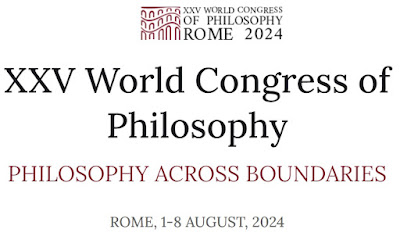WELCOME FROM THE PRESIDENT OF FISP
DERMOT MORAN
PRESIDENT OF THE INTERNATIONAL FEDERATION OF PHILOSOPHICAL SOCIETIES
As President of FISP, and thereby as President of this Congress, it is my great honour
and privilege to invite you to participate in the 24th World Congress of Philosophy, to
be held, from August 13-20, 2018, on the campus of Peking University, with its beautiful
lakeside walks around Weiming Lake, a former imperial garden.
I am very pleased that the 24th World Congress is being hosted by China.
China has an
impressively long history of philosophy and the cultivation of wisdom more generally and has
made an enduring contribution to world heritage. One can think immediately of Confucius(孔
子), Mencius(孟子), Lao Tze(老子), Chuang Tze(庄子), Mo Tzu(墨子 ), Chu Hsi(朱熹),
and Wang Yang-ming(王阳明). Confucius (c. 551B.C.E.- c. 479B.C.E.) was, more or less, a
contemporary of the early Greek sage Heraclitus (c. 535B.C.E. - 475B.C.E.), but much more of
Confucius’ sayings are preserved in the Analects, compiled after his death, in contrast to the
rather limited fragments of Heraclitus that are available. Indeed, because of his important
contributions to moral and political philosophy, Confucius is most often compared with the
later figure of Aristotle (384–322 B.C.E.).
Chinese philosophy represents a long, continuous tradition that has absorbed many elements
from other cultures, including India. China has been in contact with the scientific traditions
of Europe at least since the time of the Jesuit Matteo Ricci (1552-1610), who resided at the
Imperial court in Beijing. Indeed, Ricci is buried in Beijing. International interest in classical
Chinese philosophy, already evident in Leibniz, is growing at an extraordinary rate. There
are, for instance, more than 150 translations in the English language of the Dao De Jing (Tao
Te Ching).
We have much to learn about philosophy in China.
Peking University, founded in 1898 as the Imperial University, the successor to the imperial
academy, has a rich philosophical heritage, with the oldest philosophy department in
China. Indeed, it was home to the great Chinese scholar Feng Yulan(冯友兰), whose A
Short History of Chinese Philosophy (1948) is still a reliable guide for students of Chinese
thought. The author and philosopher Hu Shih ( 胡 适,1891-1962), a student of John
Dewey at Columbia University, even became President of Peking University, and also wrote
an important history of Chinese philosophy.
Over the years, Western philosophers from
Bertrand Russell (in 1920), John Dewey, Jean-Paul Sartre and Simone de Beauvoir (in 1955),
have all visited Peking University. Indeed, reputedly, Bertrand Russell gave his first lecture
in Peking University to an audience of 1500 people.
Paul Ricoeur visited in 1999; Jürgen
Habermas in April 2001; Jacques Derrida in September 2001; Richard Rorty in 2004; and
Saul Kripke in 2012, to name but a few of the many Western scholars who have taught in
China.
It is my fervent hope that after this Congress, there will be renewed international
interest in Chinese philosophy, and philosophers of East and West will look at world
problems enriched by new perspectives and approaches.
Philosophy, wherever it is practiced, is inextricably bound up with local language, culture,
and tradition.
But philosophy also seeks always to interrogate its conditions and transcend
its local limitations in bold and creative ways in search of enduring, universal truth. Since
the beginning of the twentieth century, international philosophy congresses have added an important new dimension to the practice of philosophy.
The first International Congress of
Philosophy took place in Paris in 1900. Bertrand Russell reported that it changed his life
because he met the Italian logician Giuseppe Peano. In attendance in Paris were the great
scholars of the day, including Henri Bergson, Paul Natorp, Henri Poincaré, Georg Simmel
and Hans Vaihinger, among many others. Subsequent congresses have been equally groundbreaking.
The 1908 conference in Heidelberg was presided over by Emile Boutroux, and
included plenary sessions by Josiah Royce, Wilhelm Windelband and Benedetto Croce.
Although he could not attend, Edmund Husserl wrote an address that was read out at the
1934 Congress in Prague. Subsequent congresses have been held in the great cities of the
world, including Amsterdam (1948), Brussels (1953), Venice (1958), Mexico (1963), Vienna
(1968), Montreal (1983), Brighton (1988), Moscow (1993), Boston (1998), Istanbul (2003),
Seoul (2008), Athens (2013), and now Beijing. Plenary speakers at the Athens Congress
in 2013 included Susan Haack, John McDowell, Keiichi Noe, Souleymane Bachir Diagne, and
Abdussalam Guseinov, to name but a few.
This Congress promises to be even more international.
The 24th World Congress of Philosophy in Beijing offers by far the largest, richest, and
most diverse philosophy program that has ever been offered at any World Congress.
The
program reflects a genuine attempt to move beyond narrowly Western ways of approaching
philosophy in terms of its traditional (largely Greek) categories.
The program has been
carefully designed to include recognition of East and West, North and South. Philosophy
in all its forms is included --not just philosophy as traditionally understood in the great
systems of Greek, Indian, Jewish, Christian, Islamic, and Chinese thought-- but also Marxist
philosophy, environmental philosophy, philosophy of indigenous cultures, philosophy of
cosmopolitanism, philosophy at the margins.
There is a symposium that discusses not just
love (caritas) but humanity (ren), the ‘heart’, Ubuntu.
I am very happy to see that so many
distinguished international scholars and philosophers have agreed to participate in the 5
plenary sessions, 10 symposia, and 5 endowed lectures, in invited sessions, member society
sessions, round tables, 99 sessions of sections based on individual submissions, and, not
least, in the student sessions.
This Congress will reflect critically on the role of philosophy
in relation to world culture, to globalization, to the various existential and environmental threats that challenge us, citizens of the world, in our quest to realize our common humanity.
Learning to be human!
This Congress also celebrates important anniversaries. It is the bicentenary of the birth
of Karl Marx (1818-1883) with a special commemorative lecture on Marx by FISP Past
President, William McBride. It is also the 120th anniversary of the founding of Peking
University.
It is the 75th Anniversary of FISP, for which FISP Honorary President Evandro
Agazzi has prepared a wonderful exhibition. This Congress also marks the inaugural Wang
Yang-ming Lecture and the Simone de Beauvoir Lecture, two new additions to the endowed
lectures hosted during the Congress.
It is important to record with gratitude that the bold initiative to host the congress in
Beijing—and indeed the theme of the Congress itself “Learning to be Human” --came initially
from the renowned Chinese Confucian scholar Professor Tu Weiming, of Peking University,
a member of the Steering Committee of FISP.
This invitation was enthusiastically embraced
by the FISP General Assembly in Athens in 2013.
We are grateful to Professor Wang Bo,
Chair of the Department of Philosophy of Peking University, and all his colleagues there.
I want to record my special thanks to Prof. Hao Ping (President of the University Council,
Peking University), Prof. Lin Jianhua (President, Peking University) and Prof. Li Yansong
(former Vice-president, Peking University) for their personal commitment to making this
Congress a reality.
I also want to thank warmly the Chinese philosophical community,
who are strongly supportive of this Congress and, indeed, everyone involved in the
organisation of this conference.
This World Congress represents a real step forward in intercultural understanding. But it
is also a chance for philosophers from all over the world simply to walk and talk and listen
to one another.
I invite you to walk around the campus of this distinguished university,
listen to the lectures, participate in the debates, enjoy the cultural activities, and share
your experiences with others. This is true symphilosophein, philosophising together.
Welcome to Beijing!



